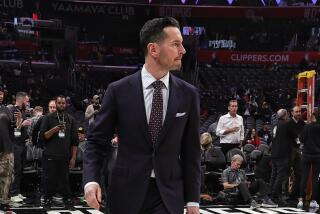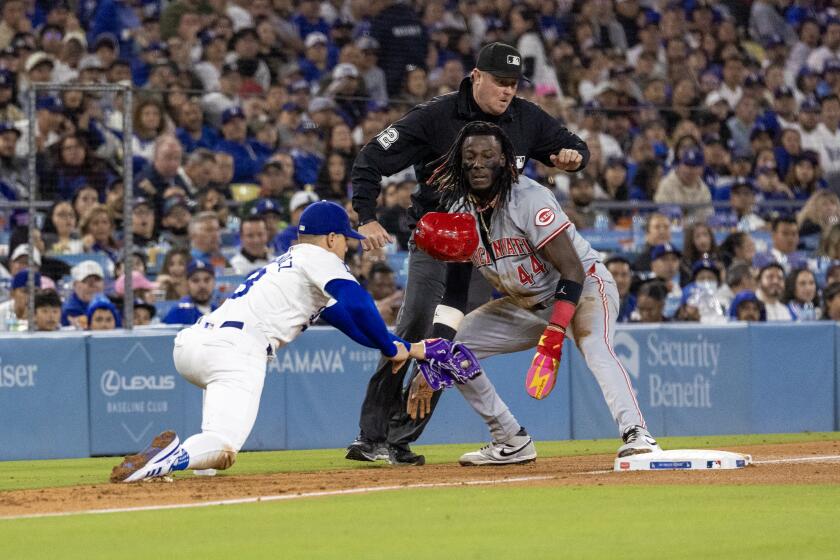Terrapins: All for One, One for All
Maryland has a guard whose parents died of AIDS when he was in high school. Juan Dixon is his name.
Maryland has a 6-foot-8 center who manhandles 7-footers and thinks nothing of it. Lonny Baxter is his name.
Maryland has a skinny guard from Florida who is fearless even though his father is afraid to fly. His name is Steve Blake.
Maryland has a backup forward who was once a starter and before that a high-school All-American and who doesn’t care at all about being a reserve. His name is Danny Miller.
Maryland has another forward who could have been a top-10 NBA pick last season but came back to school because he just likes it, just likes hanging out on campus with his girlfriend and doesn’t care if people thought he was nuts for coming back to school. Terence Morris is his name.
Maryland has a third forward who suffered a broken foot and lost his starting spot, who came back and worked extra hours in the gym, who is 6-10 and weighs 247 pounds and who steps behind the three-point arc confidently. His name is Tahj Holden.
Maryland has a slouching, slumping, hands-raised-to-the-
gods, pull-out-his-hair coach who can’t stop yelling, even when his team is up by 14 points and there are 20 seconds to play. His name is Gary Williams.
It isn’t the names that are important on this Maryland team, it is the story attached to each name.
For the first time in school basketball history, which started in 1904, a Maryland team is going to the Final Four. The Terrapins, seeded third in the NCAA West Regional, beat top-seeded Stanford, 87-73, Saturday. The win was decisive. It was not built of luck but of skill and speed, of smartness and heart.
Maryland is a team in the best and literal meaning of this word. It is a team where everybody matters, where players take the suffering of each other and make it into a strength.
All the Terrapins speak with amazement of watching the way Dixon has grown into a strong man after he was made an orphan in high school. They will protect Dixon, will ask people to stop the questions when they see Dixon is tired of speaking about how his mother and father, both heroin addicts, taught him the importance of school and family. All the Terrapins say that if they are feeling bad they stop a moment and think of Dixon.
Baxter, a 260-pound junior, was named most outstanding player of the West Regional. Baxter had 24 points and six rebounds against Stanford and 26 points and 14 rebounds against Georgetown in the semifinals.
In both games Baxter played against not one or two but three or four men who were at least two inches taller than him. It didn’t matter. Baxter believed in his own strength and his teammates.
“They got me the ball in the right places,” he said. “And my coach, he has great game plans.”
None of the Terrapins wanted to take any credit for themselves. All wanted to win this game for their coach and for their school. But not for themselves.
Williams plays 10 guys. Some, such as Miller and Holden, have been starters and could be bitter. But they’re not. “We’re in this together,” Holden said.
“Coach must know what he’s doing with us,” Miller said. “Look where we are.”
Maryland has always been the ugly stepsister of the Atlantic Coast Conference. It did not have the pedigree of Duke or North Carolina or Virginia or Wake Forest. It had the reputation of winning when it didn’t matter and losing when it did. Williams might have brought five teams into the Sweet 16 in eight years but he wasn’t getting to the Final Four so he must be a loser. That’s what you heard around ACC territory.
After Maryland blew a 10-point lead in the last 54 seconds of regulation and then lost to Duke at home in January, whispers of Williams’ fragility grew loud. Then Maryland lost five of six games and missing the NCAA tournament altogether seemed more realistic than this Final Four trip.
“It could have gone either way, the season,” senior Mike Mardesich said. Mardesich is another kid who has been a starter and who is happy to be whatever he is now. “It was a very low point when we lost to Florida State and things could have gone all the way downhill.”
Said Williams: “It’s a tribute to these kids. They never got on each other, they never quit on each other. When things were going bad, they’d come and work extra. That’s something. When you’re losing you don’t like the game very much.”
Yet these Terrapins have played with fearless confidence all through this tournament. Even in the first game, against George Mason, when the Patriots had a shot to win the game in the last 10 seconds, the Terrapins haven’t acted worried.
What Maryland has become is a group of kids who believe in each other. “We know that everybody will do their best,” Dixon said. “We have stuck with each other in adversity. We didn’t get down on each other when things were looking bad and we know we have what it takes to pull out of bad things.”
When Stanford made a second-half run to pull within three points, when the Arrowhead Pond, filled with Stanford fans, grew loud with Cardinal cheering, Baxter backed into the lane, made a layup, was fouled, made the free throw and after a Ryan Mendez miss, Dixon floated effortlessly away from his defender and swished a 24-foot three-point shot.
The collective gasp from the crowd was as loud as the cheers a minute earlier. From 42-39 up and faltering, the Terrapins were now up, 48-39, and dancing. And right after that Blake, who usually passes, chose to shoot the three and make it. Now the score was 51-39 and the Cardinal was finished.
Even though there were still 16 minutes to play, the Cardinal was done. Maryland was not intimidated by the big, strong twins, Jason and Jarron Collins. “Their footwork was slow, I noticed,” Baxter said. “I could work with that.”
And the Cardinal could not handle Maryland’s speed. The Terrapins made 58.2% of their shots. It was partly because they were so often getting wide-open looks in perfect rhythm.
Williams spoke afterward of how much he liked this team. He liked how hard it had worked, how the kids had never quit on him, how they had drawn strength from the bad time instead of becoming bitter.
All credit to the kids, Williams said. All credit to the coach, the kids said.
All credit to both now.
*
Diane Pucin can be reached at her e-mail address: diane.pucin@latimes.com.
More to Read
Get our high school sports newsletter
Prep Rally is devoted to the SoCal high school sports experience, bringing you scores, stories and a behind-the-scenes look at what makes prep sports so popular.
You may occasionally receive promotional content from the Los Angeles Times.





